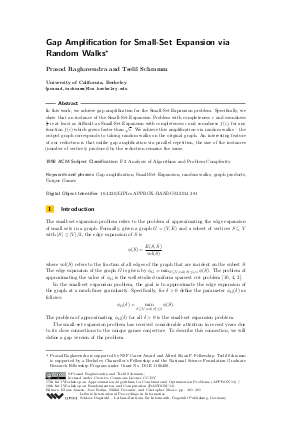Gap Amplification for Small-Set Expansion via Random Walks
Authors Prasad Raghavendra, Tselil Schramm
-
Part of:
Volume:
Approximation, Randomization, and Combinatorial Optimization. Algorithms and Techniques (APPROX/RANDOM 2014)
Part of: Series: Leibniz International Proceedings in Informatics (LIPIcs)
Part of: Conference: International Conference on Randomization and Computation (RANDOM)
Part of: Conference: International Conference on Approximation Algorithms for Combinatorial Optimization Problems (APPROX) - License:
 Creative Commons Attribution 3.0 Unported license
Creative Commons Attribution 3.0 Unported license
- Publication Date: 2014-09-04
File

PDF
LIPIcs.APPROX-RANDOM.2014.381.pdf
- Filesize: 412 kB
- 11 pages
Document Identifiers
Subject Classification
Keywords
- Gap amplification
- Small-Set Expansion
- random walks
- graph products
- Unique Games
Metrics
- Access Statistics
-
Total Accesses (updated on a weekly basis)
0PDF Downloads0Metadata Views
Abstract
In this work, we achieve gap amplification for the Small-Set Expansion problem. Specifically, we show that an instance of the Small-Set Expansion Problem with completeness epsilon and soundness 1/2 is at least as difficult as Small-Set Expansion with completeness epsilon and soundness f(epsilon), for any function f(epsilon) which grows faster than (epsilon)^(1/2). We achieve this amplification via random walks--the output graph corresponds to taking random walks on the original graph. An interesting feature of our reduction is that unlike gap amplification via parallel repetition, the size of the instances (number of vertices) produced by the reduction remains the same.
Cite As Get BibTex
Prasad Raghavendra and Tselil Schramm. Gap Amplification for Small-Set Expansion via Random Walks. In Approximation, Randomization, and Combinatorial Optimization. Algorithms and Techniques (APPROX/RANDOM 2014). Leibniz International Proceedings in Informatics (LIPIcs), Volume 28, pp. 381-391, Schloss Dagstuhl – Leibniz-Zentrum für Informatik (2014)
https://doi.org/10.4230/LIPIcs.APPROX-RANDOM.2014.381
BibTex
@InProceedings{raghavendra_et_al:LIPIcs.APPROX-RANDOM.2014.381,
author = {Raghavendra, Prasad and Schramm, Tselil},
title = {{Gap Amplification for Small-Set Expansion via Random Walks}},
booktitle = {Approximation, Randomization, and Combinatorial Optimization. Algorithms and Techniques (APPROX/RANDOM 2014)},
pages = {381--391},
series = {Leibniz International Proceedings in Informatics (LIPIcs)},
ISBN = {978-3-939897-74-3},
ISSN = {1868-8969},
year = {2014},
volume = {28},
editor = {Jansen, Klaus and Rolim, Jos\'{e} and Devanur, Nikhil R. and Moore, Cristopher},
publisher = {Schloss Dagstuhl -- Leibniz-Zentrum f{\"u}r Informatik},
address = {Dagstuhl, Germany},
URL = {https://drops.dagstuhl.de/entities/document/10.4230/LIPIcs.APPROX-RANDOM.2014.381},
URN = {urn:nbn:de:0030-drops-47108},
doi = {10.4230/LIPIcs.APPROX-RANDOM.2014.381},
annote = {Keywords: Gap amplification, Small-Set Expansion, random walks, graph products, Unique Games}
}
Author Details
References
-
Sanjeev Arora, Boaz Barak, and David Steurer. Subexponential algorithms for unique games and related problems. In FOCS, pages 563-572, 2010.

-
Sanjeev Arora, James R. Lee, and Assaf Naor. Euclidean distortion and the sparsest cut. Journal of American Mathematical Society, 21:1-21, 2008.

-
Sanjeev Arora, Carsten Lund, Rajeev Motwani, Madhu Sudan, and Mario Szegedy. Proof verification and the hardness of approximation problems. JACM: Journal of the ACM, 45, 1998.

-
Sanjeev Arora, Satish Rao, and Umesh Vazirani. Expander flows, geometric embeddings and graph partitioning. In Proceedings of the thirty-sixth annual ACM Symposium on Theory of Computing (STOC-04), pages 222-231, New York, June 13-15 2004. ACM Press.

-
Irit Dinur and David Steurer. Analytical approach to parallel repetition. CoRR, abs/1305.1979, 2013.

-
Shayan Oveis Gharan and Luca Trevisan. Approximating the expansion profile and almost optimal local graph clustering. In FOCS, pages 187-196, 2012.

-
Johann Hȧstad. Some optimal inapproximability results. Journal of the ACM, 48(4):798-859, 2001.

-
Holenstein. Parallel repetition: Simplifications and the no-signaling case. In STOC: ACM Symposium on Theory of Computing (STOC), 2007.

-
Tsz Chiu Kwok and Lap Chi Lau. Personal communication, 2014.

-
Frank Thomson Leighton and Satish Rao. Multicommodity max-flow min-cut theorems and their use in designing approximation algorithms. J. ACM, 46(6):787-832, 1999.

-
Anand Louis, Prasad Raghavendra, and Santosh Vempala. The complexity of approximating vertex expansion. CoRR, abs/1304.3139, 2013.

-
Ryan O'Donnell and David Witmer. Markov chain methods for small-set expansion. Arxiv arXiv:1204.4688, 2012.

-
Prasad Raghavendra and David Steurer. Graph expansion and the unique games conjecture. In STOC, pages 755-764, 2010.

-
Prasad Raghavendra, David Steurer, and Madhur Tulsiani. Reductions between expansion problems. In IEEE Conference on Computational Complexity, pages 64-73, 2012.

-
Anup Rao. Parallel repetition in projection games and a concentration bound. In Richard E. Ladner and Cynthia Dwork, editors, Proceedings of the 40th Annual ACM Symposium on Theory of Computing (STOC'08), pages 1-10. ACM, 2008.

-
Ran Raz. A parallel repetition theorem. SIAM Journal on Computing, 27(3):763-803, June 1998.

-
David Steurer. On the Complexity of Unique Games and Graph Expansion. PhD thesis, Princeton University, 2010.

